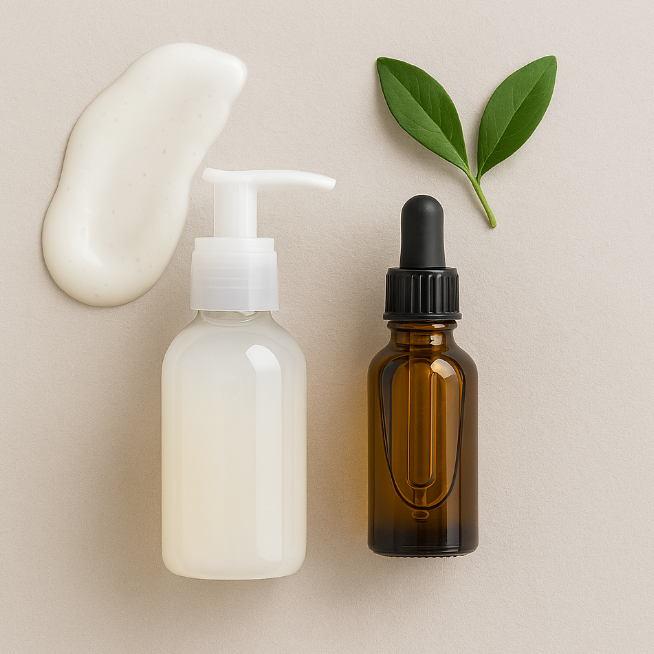Introduction
In recent years, the silicones in cosmetics have become the subject of debate in the beauty world. Accused of being harmful to the skin and the environment, they are often avoided by those who choose natural or eco-friendly products. But how much truth is there in the criticism? Are silicones really a threat or is it a myth that needs to be dispelled? In this article we look at what silicones are, what effects they have on skin and hair, why they are so prevalent in the cosmetics industry and what are possible more sustainable alternatives.
What are silicones?
I silicones are ingredients of synthetic origin derived from silicon, a mineral naturally present on Earth. In cosmetics, they are used in the form of oils or gels to give products an smooth and silky texture, improving spreadability and giving an immediate smoothing effect. They are particularly common in:
- Face and body creams
- Foundation and primer
- Shampoos and conditioners
- Anti-frizz and styling products
The most common silicones include:
- Dimethicone
- Cyclopentasiloxane
- Cyclohexasiloxane
- Amodimethicone
The advantages of silicones in cosmetics
Despite their bad reputation, silicones are widely used for several reasons:
1. Immediate aesthetic effect
Silicones form a thin film on the skin or hair that gives a smooth, silky and radiant appearance. In the hair, they tame frizz and facilitate styling; on the skin, they minimise pores and make make-up look more even.
2. Skin tolerability
Silicones are generally hypoallergenic, non-comedogenic (they do not clog pores) and well-tolerated even by sensitive skin, as they do not penetrate deeply but remain on the surface.
3. Temporary Protection
By forming a barrier on the skin or hair, they help protect them from external agents such as wind, smog, heat and humidity.
The limits and risks of silicones
Despite the aesthetic benefits, there are some critical issues related to the prolonged use of silicones:
1. Mask effect“
Silicones do not feed nor do they really moisturise: they only create a temporary illusion of smooth skin or healthy hair. This effect can “hide” the real condition of the skin or hair.
2. Accumulation and buildup
In hair, the constant use of products containing silicones can lead to a accumulation which makes them heavy, dull and difficult to treat. Even the skin, while not being “suffocated”, can suffer from the lack of truly moisturising or nourishing active ingredients.
3. Environmental impact
Many silicones (particularly those birds such as Cyclopentasiloxane and Cyclohexasiloxane) are difficult to dispose of and can polluting the waters. As non-biodegradable substances, they persist in the environment and have a negative impact on aquatic flora and fauna.
How to recognise silicones in cosmetic products
Read the’INCI (the list of ingredients on the packaging) is the easiest way to identify them. Silicones are easily recognisable because their name usually ends in -cone, -xane o -siloxane. Some examples:
- Dimethicone
- Cyclomethicone
- Amodimethicone
- Trimethylsiloxysilicate
If you wish to avoid them, prefer transparent brands that explicitly indicate “silicone-free” on the label or have reliable eco-bio certifications.
Green alternatives to silicones
Fortunately, today there are many alternatives natural and ecological that offer similar benefits without the side effects of silicones. Here are some of the most effective ones:
1. Pure vegetable oils
Jojoba, coconut, argan or avocado oil: deeply nourishes, gives shine to the hair and smoothness to the skin, without creating an occlusive film.
2. Natural butters
The shea butter and the mango butter are perfect for moisturising and protecting skin and hair in a natural way.
3. Natural derivatives of maize or sugar cane
Used in green formulas to give smoothness and “silk” effect without petroleum derivatives.
4. Silicones of vegetable origin
Some green laboratories are developing silicones of natural origin, obtained from plant fermentations, which simulate the same aesthetic performance but with a much reduced environmental impact.
Are silicones a threat? The verdict
Silicones are not hazardous to health, and in most cases do not cause allergies or direct skin damage. However, they provide no real benefit to the skin or hair: their effect is mainly aesthetic and temporary.
If your goal is to obtain an authentic and lasting beauty, better to go for natural cosmetics rich in active plant ingredients. Furthermore, if you care about environmental sustainability, choose products silicone-free is an important step towards a more ethical and responsible beauty routine.
Conclusion
Silicones in cosmetics are not an absolute evil, but they must be used with awareness. They offer immediate results, but hide limitations for both the long-term health of hair and skin and the environment. If you want to adopt a more natural and sustainable beauty style, Green Wellness Beauty helps you discover products approved by Yuka, formulated without silicones, parabens or harmful ingredients.
Visit greenwellnessbeauty.com to learn more, read reviews, discover eco-friendly alternatives and take care of yourself while respecting your body and the planet.

